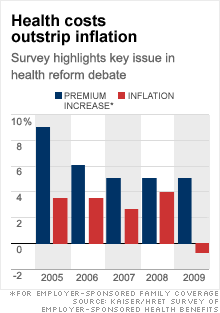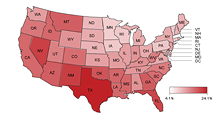Senate tax hike misses the mark
Compromise is the backbone of legislative success. But in the Senate, the search for votes could undercut the potential of reform to lower health spending.

NEW YORK (CNNMoney.com) -- The health care bill that passed a crucial test vote in the Senate on Saturday is proof that getting reform passed and getting it right are two very different things.
Both are hard. But the pursuit of votes has weakened key elements with the most promise of reducing overall health spending.
Exhibit A: The eleventh-hour introduction of a Medicare tax hike as a way to help pay for reform.
Health care reform, to succeed, must not only help more people get coverage but also slow the growth in health costs and spending.
The latest balancing act has been led by Senate Majority Leader Harry Reid, D-Nev.
Reid crafted a Senate bill that blends elements from bills passed by two Senate committees and adds some new measures. The hybrid bill must garner support not only in the Senate, but also in the House, which passed a different version earlier this month.
To that end, Reid included an increase in the Medicare tax on high-income workers to help pay for the cost of reform. Under the bill, individuals making more than $200,000 ($250,000 for joint filers) would pay a 1.95% Medicare tax on their wages, up from the current 1.45%.
The tax certainly would raise revenue. The Congressional Budget Office estimates $54 billion over 10 years. But experts say it would not curtail spending as the tax proposal approved in October by the Senate Finance Committee.
The problem is the Senate Finance proposal, known as the Cadillac tax, has drawn political opposition.
Under the Senate Finance bill, a 40% excise tax would be imposed on insurers that offer benefits in employer health plans for which the cost of individual coverage exceeds $8,000 and the cost of family coverage exceeds $21,000.
Opponents say the excise tax would effectively get passed down to workers.
But supporters say it holds the promise of reducing the growth in health spending over time. Why? As more and more plans become subject to the tax, employers will instead opt for lower-cost options to avoid the tax.
A hike in the Medicare tax, on the other hand, holds no such promise, experts said.
"A higher Medicare payroll tax rate for upper-income people would provide no incentive at all to reduce costs or spending on health care," said Stuart Butler, vice president of economic policy at the conservative Heritage Foundation.
Nor for that matter would a surtax on the wealthy - which is a major revenue raiser in the House-passed reform bill.
Reid didn't get rid of the Cadillac tax altogether. But he raised the thresholds that determine whether a plan is subject to the tax to $8,500 for individual coverage and $23,000 for family coverage. That means the tax would not reduce health spending as quickly because fewer employers would be subject to it initially.
"It sort of just delays things a little bit," said Paul Fronstin, director of the health research program of the Employee Benefit Research Institute.
Of course, as with most elements of the health reform effort, there's plenty of uncertainty about how well the excise tax would work in reducing health spending over time.
But what is certain is that the excise tax is a far weaker version of what health policy experts and some lawmakers originally proposed: To eliminate or at least limit the tax-free nature of the health care subsidies that workers get from their companies.
Currently, the portion of premiums paid by employers is treated as tax-free compensation, and there is no limit on how much employers may contribute.
A cap would mean workers might have to pay income tax on some portion of their employer's contribution to their health care.
And when that happens, the thinking goes, workers would instead choose lower-cost plans to escape the added tax.
That idea never took flight for the same reason that the excise tax isn't winning popularity contests: Workers would pay.
Hence its more contorted cousin: the excise tax on high-cost health plans.
And even the excise tax was watered down before it hit Reid's desk. Critics complained the original thresholds were too low, and thereby would catch too many plans. So the thresholds were raised before the Finance Committee voted through its health reform bill.
Of course, the reshuffling and tweaking of proposals to pay for reform is far from over. The bill still needs to move through the Senate and then, if it passes, into conference with the House.
But it's a fair bet that the end result will be a hodgepodge of pay-fors designed more to secure votes and keep the bill deficit neutral than to reduce spending.
"Finding the revenue to pay for health reform was always going to be a huge challenge," wrote tax expert Howard Gleckman, editor of the TaxVox blog. "It still is, but we are beginning to see the outlines of a deal - a little income tax surcharge here, a dollop of insurance premium excise tax there, and more than a few cats and dogs." ![]()


